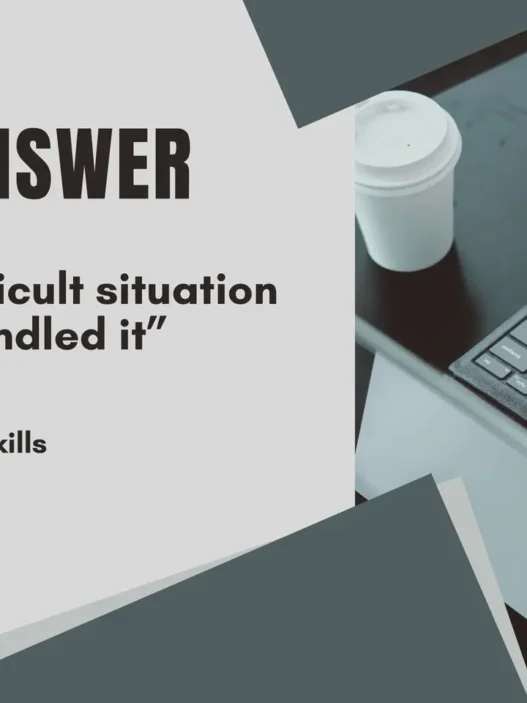Landing a job interview is a significant milestone in your job search journey, but preparing for it is crucial to maximize your chances of success. Whether you’re a first-time job seeker or an experienced professional, preparation can set you apart from other candidates. Here’s your ultimate guide on how to prepare for an interview, ensuring you walk in with confidence and leave a lasting impression.
1. Carefully Analyze the Job Description
Before you even think about the interview questions, it’s essential to analyze the job description. Understanding the qualifications, skills, and experiences the employer is seeking will give you insights into what to emphasize in your responses.
What to Look for in a Job Description:
- Required qualifications: Ensure you align your experience with the key requirements.
- Skills and competencies: Highlight your strengths in these areas.
- Company culture: Identify traits that the company values to show you’re a great fit.
By analyzing these points, you can tailor your responses to match what the employer is looking for, helping you stand out as the ideal candidate.
2. Review Your Resume and Qualifications
Next, revisit your resume and reflect on your qualifications. It’s crucial to prepare for questions that require you to elaborate on your professional background. Think about how your experiences and skills align with the job you’re applying for.
What to Focus On:
- Key accomplishments: Highlight your successes and how they translate into the new role.
- Transferable skills: Be ready to discuss how your skills can be applied in the position.
- Career goals: Know how this job fits into your long-term career aspirations.
By reviewing your qualifications, you’ll be ready to confidently explain how your experience makes you the perfect fit for the role.
3. Research the Company Thoroughly
In today’s competitive job market, it’s essential to know about the company you’re interviewing with. A well-prepared candidate shows genuine interest, which can give you an edge over others.
Key Areas to Research:
- Company mission and values: Understand the company’s culture and how it aligns with your values.
- Company history and milestones: Knowing significant achievements demonstrates interest in the company’s journey.
- Social media and news: Keep up-to-date with the latest news, product launches, or changes within the company.
- Employee reviews and feedback: Sites like Glassdoor can provide insights into the work environment.
Knowing about the company will not only help you during the interview but also allow you to ask insightful questions that demonstrate your enthusiasm for the role.
4. Practice Common Interview Questions
Preparation is key when it comes to common interview questions. Practicing your answers helps you feel more confident and articulate during the interview. Be ready to discuss your strengths, weaknesses, career goals, and accomplishments.
Common Interview Questions to Practice:
- Why do you want to work here?
- Tailor your answer to the company’s mission, and explain how your career goals align with the role.
- What are your strengths and weaknesses?
- Share both hard and soft skills, and discuss how you’re working on your weaknesses.
- Where do you see yourself in 5 years?
- Link your aspirations with the opportunities within the company, showing you’re committed to long-term growth.
Tip: Keep your answers concise but impactful. Use the STAR method (Situation, Task, Action, Result) for behavioral interview questions to provide structured responses.
5. Prepare for Role-Specific Assessments
In some interviews, you may face a skills test or problem-solving scenario. These assessments help employers understand how you approach challenges and apply your expertise.
Types of Role-Specific Evaluations:
- Technical tests: For jobs in fields like IT or engineering, expect to be tested on your technical skills.
- Case studies or simulations: For management or consulting roles, you may need to solve a hypothetical problem.
Prepare by reviewing key concepts related to the role and practicing problem-solving techniques. Make sure to talk through your thought process during the evaluation so the interviewer understands how you approach tasks.
6. Prepare Thoughtful Questions for the Interviewer
One of the best ways to stand out is by asking insightful questions. Thoughtful questions show your enthusiasm for the role and your understanding of the company.
Examples of Great Questions to Ask:
- What does a typical day look like in this role?
- What challenges does the team face, and how can I help?
- What’s your favorite part about working at this company?
- What are the next steps in the hiring process?
Prepare at least three to five questions to ask during the interview. Avoid asking about salary and benefits until the final stages of the process.
7. Print Multiple Copies of Your Resume
Though interviewers may have your resume digitally, having printed copies shows that you’re well-prepared and professional. Bring at least three copies – one for yourself and one for each interviewer.
Bonus Tip: Consider bringing a portfolio or examples of your work if it’s relevant to the job.
8. Plan Your Travel Arrangements
Arriving on time for your interview is crucial. Plan your travel in advance to avoid any stress on the day of the interview.
Key Travel Tips:
- Leave early: Account for traffic, delays, or any unforeseen issues.
- Know the location: Visit the building ahead of time if necessary, or review local transportation options.
- Save contact information: Keep the interviewer’s contact details handy in case of last-minute issues.
Arriving 15-20 minutes early will give you time to settle and mentally prepare for the interview.
9. Draft a Follow-Up Email
After the interview, sending a follow-up email is a professional gesture that reinforces your interest in the position. A well-crafted follow-up message can set you apart and leave a lasting positive impression.
What to Include in Your Follow-Up:
- Express gratitude: Thank the interviewer for their time.
- Reaffirm interest: Restate why you’re excited about the role and how your qualifications make you a great fit.
- Mention any missed points: If there’s something you didn’t cover during the interview, briefly mention it in your email.
Tip: Send your follow-up email within 24 hours of the interview to show your promptness and enthusiasm.
10. Stay Calm and Confident
Finally, remember that the interview is as much about your personality and cultural fit as it is about your qualifications. Stay calm, be confident, and trust in the preparation you’ve done.
Conclusion: Your Path to Interview Success
By following these key steps, you can approach your interview with confidence and increase your chances of success. From researching the company to practicing interview questions and preparing thoughtful inquiries, each step is crucial for standing out as a top candidate.
Ready to take the next step in your career? Start by applying to your dream job today, fine-tuning your resume, and gearing up for your next interview with these expert tips. The path to your ideal job is within reach – now it’s time to take action and make it happen!


















